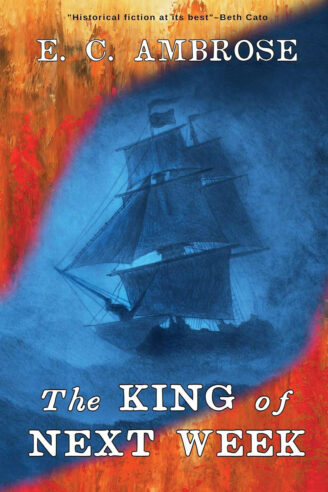People have been telling stories about strange and tempting things in the sea since at least the ancient Greeks. Do not Scylla and Charybdis count? In the age of sail, they became stories of krakens and mermaids. Even now, in an age of satellites that have mapped the entirety of the world’s oceans, tales of the sea are enrapturing to us, as the success of Pirates of the Caribbean and Master and Commander: The Far Side of the World show.
E.C. Ambrose has written a short novel which is another take on those legends: The King of Next Week.
It is the 1860s, after the end of the American Civil War. A merchant ship under the command of Matthew Percy loaded with ice stops briefly on an island somewhere near the coast of Morocco. He and his crew expect it to be empty, but they find that it is inhabited by jinn, the creatures of Islamic legend. The captain falls in love with one of these jinn, who he ends up marrying within a day of landing.
The story then becomes a strange yet intriguing sort of culture clash narrative, reminiscent of, but not entirely identical to, similar stories involving time travel or first contact with alien races. On the one hand, you have humans; physically limited, frail and with few resources at their disposal. On the other hand the jinn, who grant humans wishes, can change their appearance at will, and who can move in ways humans cannot. The most emotionally impactful moment in the novel is when a jinn has to confront how human beings are accountable to one another in ways that jinn are not.
This is also a compelling seafaring narrative. You get a sense of what a titanic venture a trans-Atlantic crossing was in those days, with all the talk of preparations and financing that underlies a ship going from Phippsburg, Maine to Europe and back. It is a novel that will satisfy any nautical buff in that regard.
It is also a book about economics, and how the fleeting nature of human existence necessitates so much of our lives. A particular aspect of commerce that is common, then and now, is completely beyond the jinn, and it leads to a number of misinterpretations and misunderstandings. One of them has to confront the America of the 1860s in all its ugliness and is appalled, especially given how the Civil War is well within living memory.
The King of Next Week was proffered to me with great enthusiasm by the Guardbridge Books table in the dealer’s room of DISCON III, the 79th World Science Fiction Convention, which was fortuitously held in Washington DC, not far from me. I am glad that they were so insistent, for Ambrose has concocted a wonderful story that goes beyond the known and yet talks so deeply about humanity. It’s an astounding book, one I recommend wholeheartedly.





